The Influencer of the Year 2018 talks to Albertine Brandon about her Irish roots, activism and embracing her sexuality.
Photography: Claire Luxton / Beauty: Kate Pope
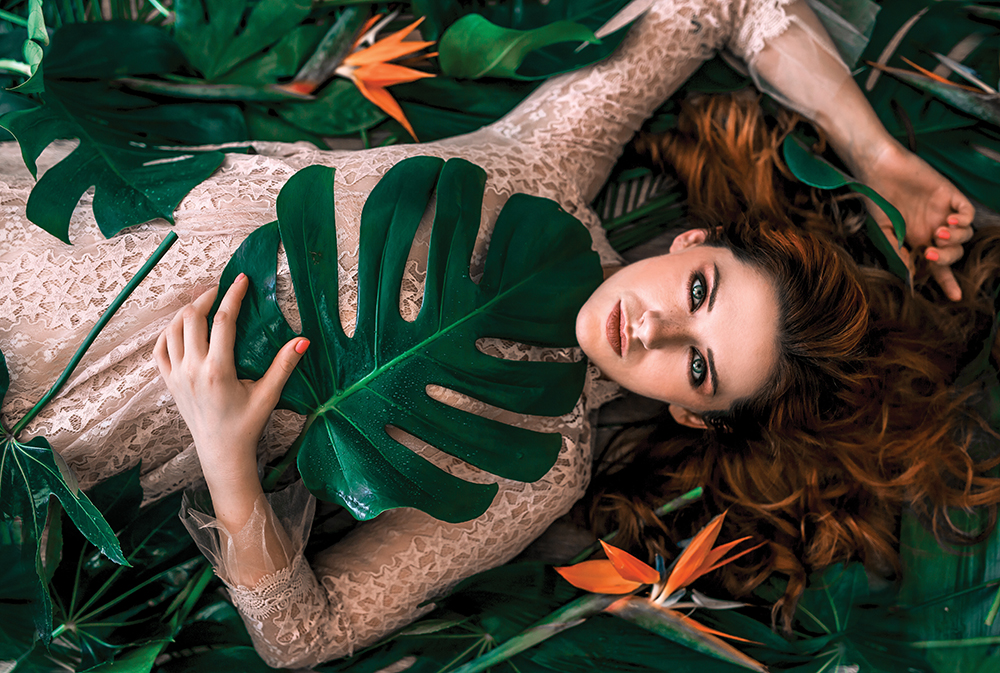
Melanie Murphy is sitting perfectly still, surrounded by tropical foliage in a West London apartment. As water from the freshly spritzed leaves drips onto her chest she stares intently into the camera lens and within minutes we have our cover shot.
The Blogosphere team, relieved, finally drop the Japanese Aralia leaves and Bird of Paradise flowers they were holding in place around Melanie’s face and relax their arms. Shooting on a balmy July day has taken its toll, but after reviewing the images that have been captured it’s evidently been worth the hours of work and (literal) sweat.
For those of you unfamiliar with Melanie’s content (where have you been?!) let me get you up to speed. The Irish 29 year old joined the world of YouTube in May 2013 while studying for a teaching degree, and over the past five years she has accumulated 553,000+ subscribers and 57.2 million video views. She uploads videos on anything and everything to her channel – from bisexuality to irritable bowel syndrome, to hormonal acne.
On June 8th, Melanie was announced as the winner of our Blogosphere Influencer of the Year award, marking her as the future cover star of issue 18, which is how we have found ourselves with the YouTuber in this stunning central London flat during a heatwave.
As we wrap the shoot our conversation is dominated by stereotypically British topics – Love Island drama and England’s surprising world cup success – and after discussing our new-found patriotism we ask Melanie about her relationship with her own motherland, Ireland.
“I don’t think I talk about Ireland, and being Irish, enough on my channel. I never wanted to be an ‘Irish YouTuber’, I wanted to be a YouTuber from Ireland, because it’s a global platform. I’ve always aimed my content at everyone, but I’ve noticed myself toning down my accent, which I hate.
“I’m working on that, I want to get to the point in a couple of years where I’m really embracing Irish culture because I want to settle down there, I love the country to bits. I went to live in LA for a while and ended up thinking ‘what am I doing?! This is not me, I need to be down the pub with everyone’.”
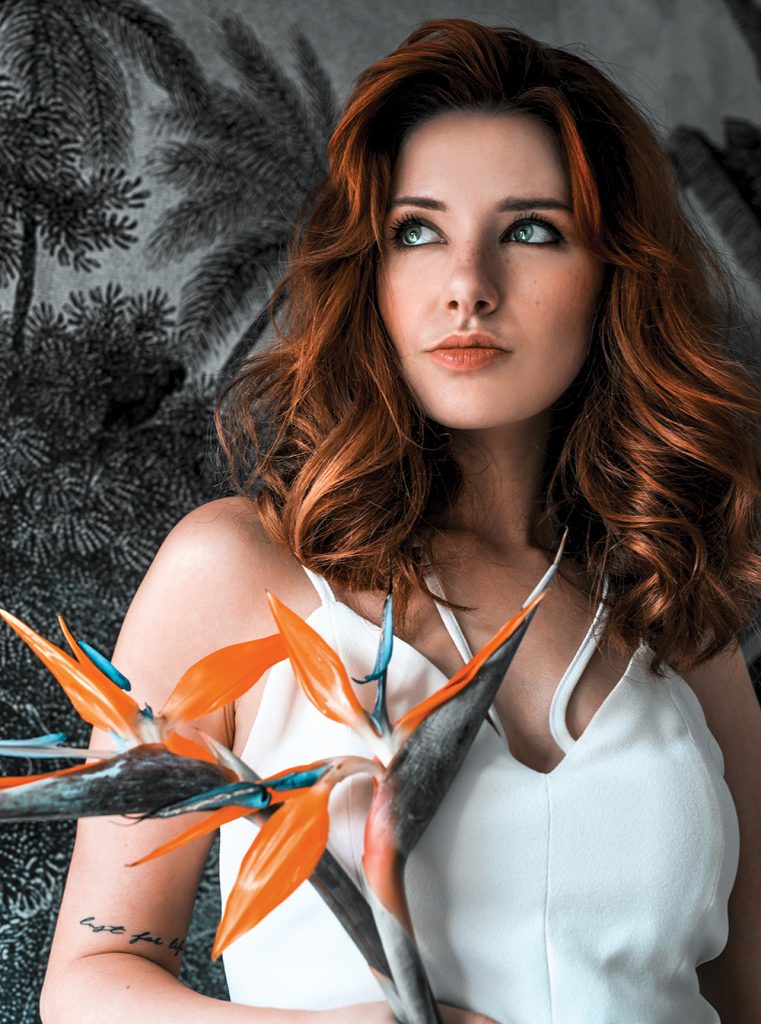
Melanie’s strong ties to Ireland mean the recent Marriage Equality Referendum and Repeal The 8th were important political moments for her, and she used her platform to encourage people to vote and educate themselves about the real stories that lie behind the legislation.
“Repeal the 8th and the Marriage Equality referendum were two pinnacle things where I felt I was in an amazing position to reach people who would be really impacted by the outcome of them.
“I don’t like when people think I just talk about products; I don’t ever want that to be how I’m perceived. I like to try to have a positive influence on people in all walks of life. It comes down to caring about your country and caring about the future generations. I think when influencers talk about political things, it has a massive effect. It’s been shown that lots more young people are going out and registering to vote, which is great.
“I get why people shy away from talking about politics, but I wish more people would just share their thoughts and opinions. Everyone has an opinion, if people don’t agree with you it’s fine, it’s not about trying to sway people, it’s about standing up for what you believe in.
“I think what’s important is encouraging healthy debate and discussion instead of the war-like atmosphere we have currently on Twitter. I’ve always wanted to have a space online where people felt comfortable talking about serious topics in a respectful way. It can be done, and it’s what I tried to do with the film I made about abortion (CHOICE). I made that film before the referendum was announced, so I wasn’t trying to push an opinion too much, I just wanted to show the reality of that situation.
“I think it’s a better way to reach people because it’s on a more human level, it’s important to understand both sides of the debate and I find that type of activism is more successful.”
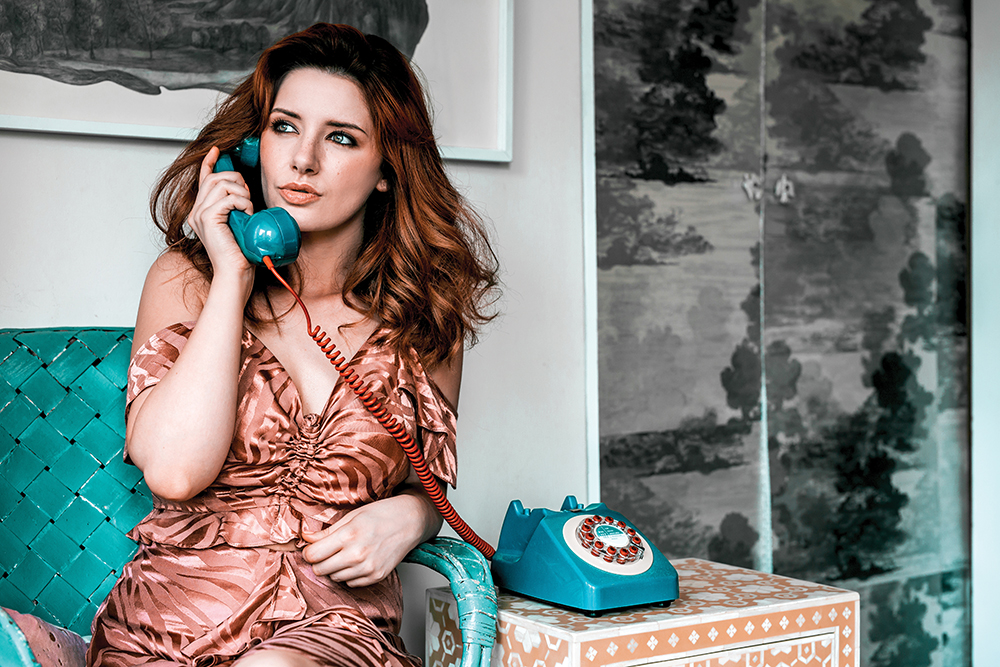
As Melanie isn’t shy about discussing polarising or taboo topics on her channel – including talking about her own struggles with orthorexia and body dysmorphia – it’s not surprising that along the way she has faced her fair share of criticisms, the most harsh of which came when discussing her diet (and why she was no longer vegan), and her acne journey.
“My food diary series was initially supposed to help people recovering from eating disorders. I wanted them to see someone having a normal day of food. When I talked about the fact that I used to be vegan (but no longer was), people acted like I was evil personified, it was so shocking. I had very established vegan YouTube channels making videos about me,
and saying that I was having a horrible influence on my viewers and that I was contributing to this huge global problem. I started questioning myself and questioning my diet, all of these things that I had gone to therapy to stop obsessing over. It made me hyper-aware of everything I did and it was difficult. The food diary got a million views within a week, and there were so many comments saying I should kill myself and that I didn’t deserve to be alive.
“I’ve had a couple of waves of that type of negativity. My video about acne also went viral and it got 18 million views. I went on Channel 4 to talk about it. People were saying that I looked disgusting and that they would never want to wake up next to someone with a face like mine. They were calling me all of the names I heard in school, but multiplied by a thousand. There were also much darker comments, and I shut down. When you’ve had a mental health problem previously, or you’ve had any issues with yourself, it’s hard to detach from it.
“Anonymity online has brought out the worst in a lot of people and the more you share, the more you are opening yourself up to attack from people, but I have learnt to distinguish between hate and constructive criticism.
“Now that I know what it feels like to be one of those people who is targeted by trolls, I’ve realised it’s true that when you have eyes on you people notice and judge everything. It’s not a nice adjustment, getting used to that, but in this industry you do have to. You have to anticipate it and ignore it because
if you rise to it they do it more. The more I’ve ignored trolls, the less it’s happened. Luckily, I get a lot less hate now.”
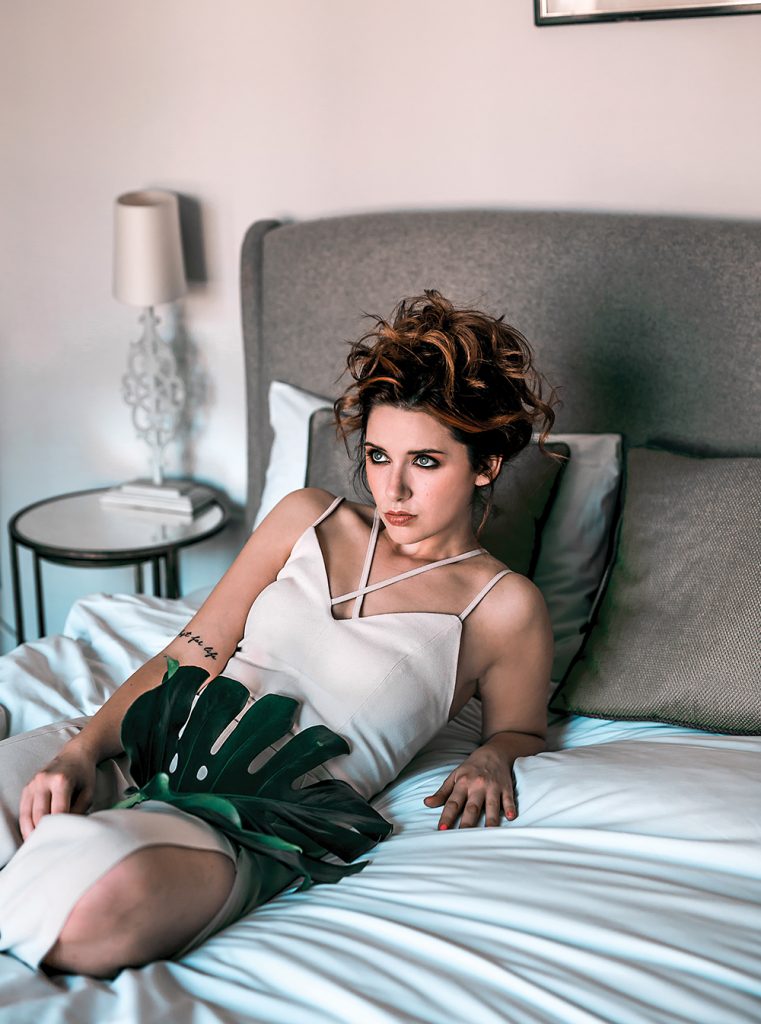
In fact, out of all of her content, Melanie has found that she gets the most positive response when she talks openly about sex and her own sexuality.
“For the first couple of years my channel was quite frivolous, so when I did start talking about sexuality it was terrifying.
“The first video in which I talked about it was based on a conversation I had with a gay friend. It was coming up to the Marriage Equality referendum and he asked if I had ever talked about my sexuality online.
“I had always talked about women in a sexual way and felt comfortable with it, but never online. Talking about it online felt so different. But once I got it out there it was like popping a bubble and my whole channel became so gay!
“It’s easier to connect with people via the internet, and people really enjoy those videos. I’ve never had such a hardcore audience, and it’s hard to know what to talk about because to me it’s just who I am, and it’s not really a topic in my life. But for other people it is because they don’t have anyone to talk to about it, so it’s important to have representation and I love that I get to be part of that.
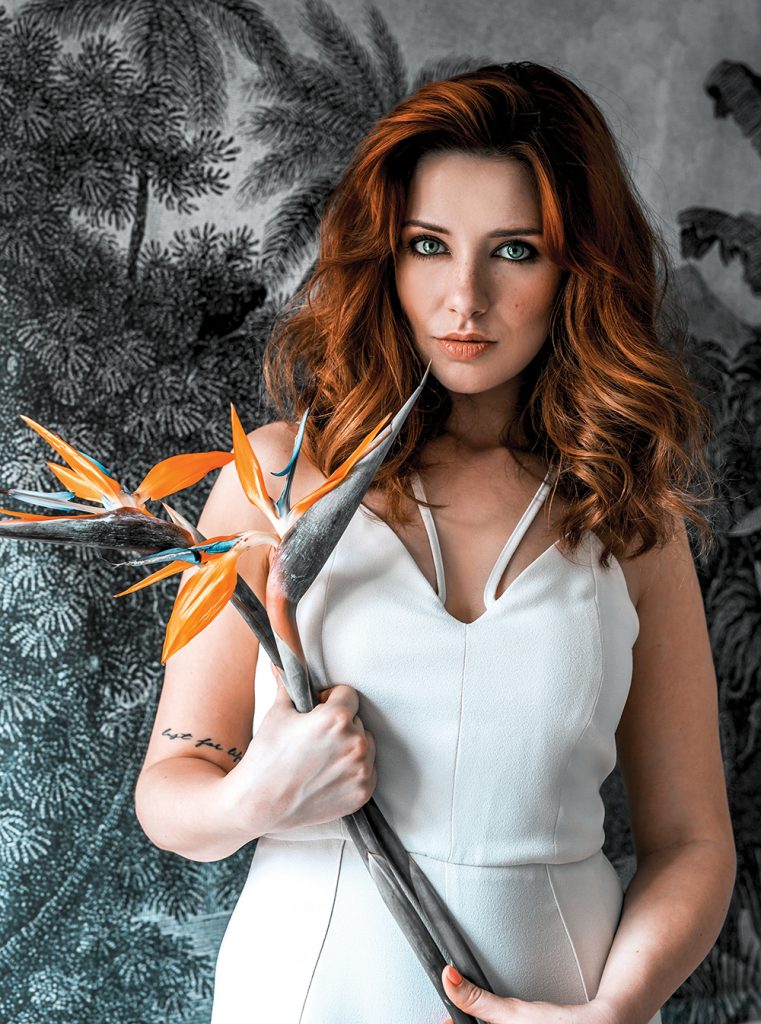
“It’s so different from when I was growing up, and the sex ed we had. I do think that social media ignites discussions within families, and self- education. I’ve learnt so much from listening to people talk about their own experiences and their lives. I think it’s the best kind of education – learning from other people and their stories.”
Melanie isn’t the only member of her family to make YouTube videos. After the success of her own channel Melanie’s sister, Jessie (Jessie B on YouTube), created her own and they frequently collaborate on videos covering a variety of topics.
“My sister is someone I can always talk to about YouTube. She understands my issues, and knows what a typical day can be like for a YouTuber. I love that we can bond over it, it’s brought us a lot closer and it gives us an excuse to hang out more.
“When we started doing videos together people responded so well to it. I think it was because they liked seeing the dynamic of people who have a real relationship on camera. I love it as well, I love watching couples, siblings and friends on YouTube. Because the response was so good, Jessie was more encouraged to start making videos herself. She started a year and a half ago and she’s just quit her job to make videos full-time. She kept at it and was consistent and an audience has steadily built, so I’m really happy for her.”
Although the sisters are close now, this bond isn’t something they’ve always had and Melanie credits YouTube with helping them to build a stronger relationship.
“There’s such a huge age gap between Jessie and me, we were not close at all before we both started doing YouTube. There were a few years when she was a teenager where we barely spoke because we just had nothing in common and I found it hard to relate to her. When she got to about 18 (and started doing videos with me) we did get a lot closer. YouTube has been this weird glue between us, it’s a common ground.”
Although her career, and a lot of her social life, relies on social media, Melanie also feels it is important to realise that the world is far bigger than the internet and she tries to ensure she has regular breaks from the online world.
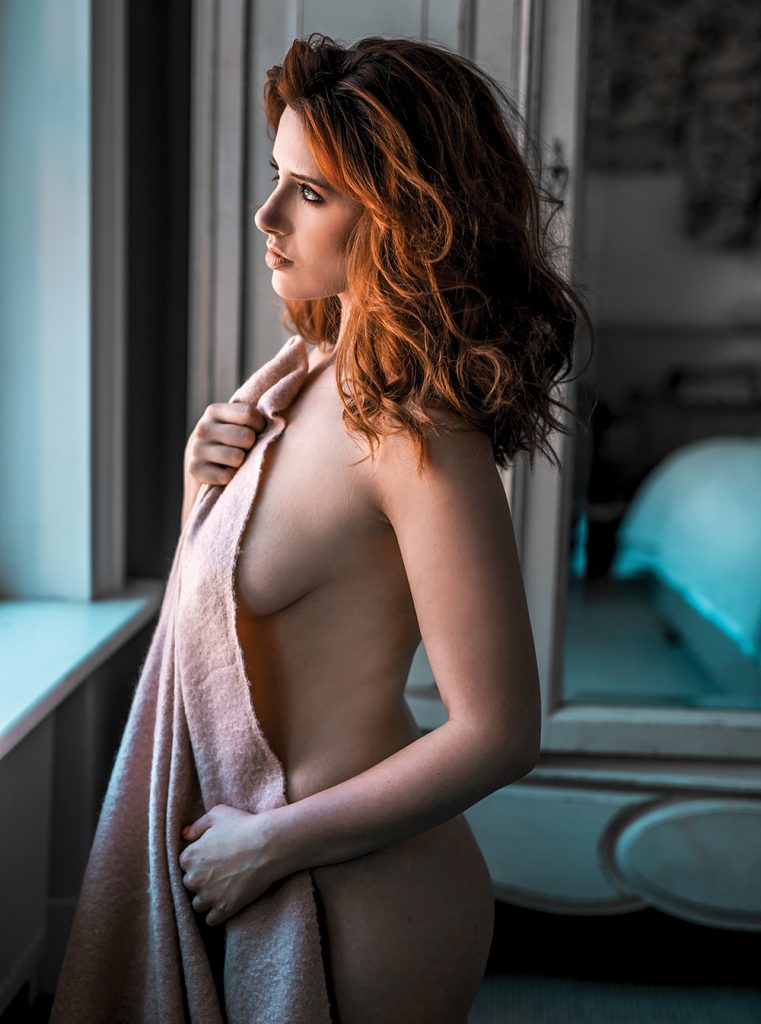
“I try to get outside and have real-life interactions at least every two days with friends. But it can be difficult and I have found myself multiple times scrolling through social media right up until I fall asleep. It is addictive, and there’s a constant fear of missing out on stuff and feeling like you’ll be out of the loop if you don’t check Twitter for two days.
“It feels like when you were at school, and you missed a couple of days, and everyone formed new groups. You feel like everything’s changed so there’s a huge pressure to always keep up to date.
“I try really hard to have time out and switch my phone off. My boyfriend and family are great with that, they know that I’m trying to do that and remind me to stop checking notifications or capturing everything. Also, with the monthly vlogs I will try to hold some stuff back and if I’m having a really nice day, I’ll remind myself that I don’t have to film it.”
During her five years of creating content Melanie feels her eyes have been opened to just how much is edited out of what is shared online, and she feels it is crucial that we make education around the use of social media (and the internet) a big part of school curriculums.
“When I started my channel, I realised how much you edit out and how much you don’t share. That helped me to understand that what I was watching and consuming was a very watered down version of real life. I think people nowadays tend to allow the interactions and engagement they get online to dictate their life. Even people who don’t have a big online profile. They’ll put up a picture on Facebook and if it doesn’t get enough likes, they think they’re ugly. We are all far too focused on that.
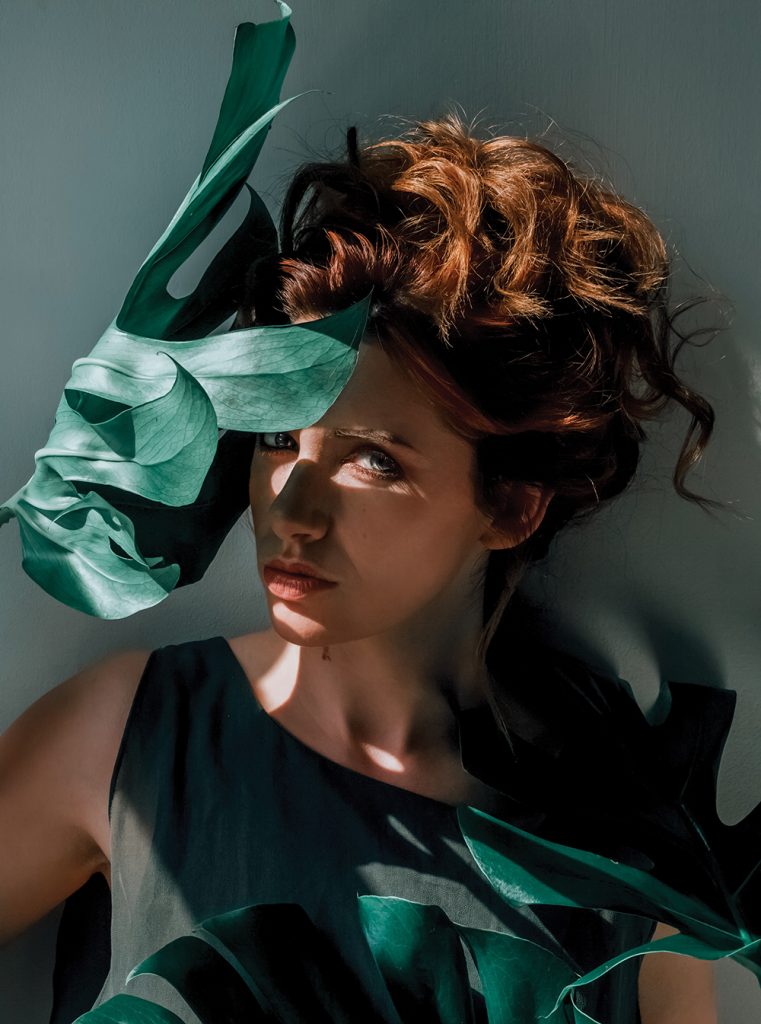
“It’s not worth feeling attached to the number of likes you get. It’s hard when it’s part of your job and the numbers dictate your fees, but it’s important to not get caught up in it. I see people lose their head and it gets to them. They grow so quickly and become really aware of what people think of them, it’s not healthy.
“I know from the teaching degree I did how long it takes to change a curriculum, but we urgently need to make social media a part of education. I worry a lot about young people and how they use social media, education around it is so important and it’s not talked about enough.”
As Melanie feels the lack of ‘real life’ moments online is an issue, sharing her highs and lows has always been important to her, especially when it comes to her monthly vlogs.
“I don’t agree with pretending you’re okay when you’re not. I think that’s really messed a lot of people up. They feel like they have to project this constant happy person, I don’t do that. But at the same time you can fall prey to the people who want to get to you. “They want you to be real and don’t want you to pretend, but when you are real and you talk about difficult things in your life that aren’t so fun you get accused of looking for attention or lying and it’s so frustrating.
“It’s important to be true to yourself, the people who follow you for the right reasons won’t judge you for being real and honest. I started doing monthly vlogs in January and that’s been quite difficult. It’s hard to get the balance between sharing the bad, down days and the good days. Obviously, not everyone struggles with mental health issues, but everyone has had difficult and sad days. When you’re vlogging over a month and you’re trying to convey a story arc over that month you do have to show some of the bad days. If you didn’t, it would be like having a window open into your life but only letting out the nice stuff, and hiding the rest. I don’t think that’s fair because viewers will compare their own lives to that.”
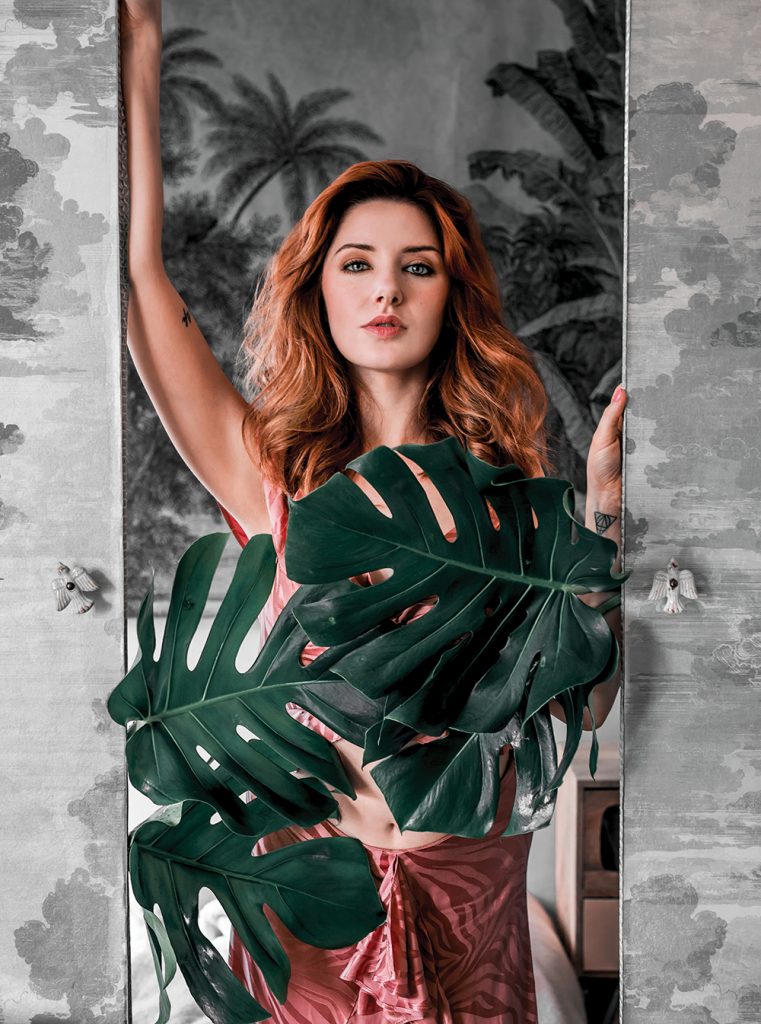
Our day with Melanie has come to an end, and as she hurries into a taxi (she’s meeting a couple of viewers for breakfast the next morning and taking part in London Pride before flying back to Dublin) we wave her off before settling down to review the images from our day of shooting. Her auburn hair and green eyes are striking in every shot, and we struggle to pick which ones will eventually feature alongside this interview.
After selecting our favourites (of which there are many), it’s time to head home. On my tube journey back to East London I reflect on my interview with Melanie and if there’s one thing I’ve learnt from the activist it’s this: regardless of Instagram likes, or YouTube subscribers, we each have a voice and in our current political climate it’s important we use it.
